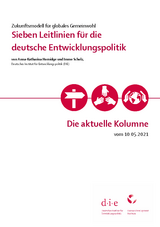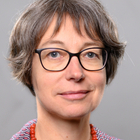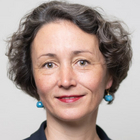The Current Column
A future model for the global common good
Seven principles to guide German development policy
Hornidge, Anna-Katharina / Imme ScholzThe Current Column (2021)
Bonn: German Development Institute / Deutsches Institut für Entwicklungspolitik (DIE), The Current Column of 10 May 2021
Download the English PDF Version!
The environment in which German development policy operates has undergone radical changes since the German Federal Ministry for Economic Cooperation and Development (BMZ) was set up 60 years ago. Back then, many partner countries were taking their first steps as newly independent nation states; now they are politically and economically established states able to stand on their own two feet. The bipolar order of the 1960s to 1980s has given way to a more complex, dynamic world. Besides the major powers – the US, China, Russia and the EU – the leading emerging economies and regional powers are also shaping economic and political interdependencies. The possibilities of how the future might look like – in economic, social, environmental and cultural terms – are thus more diverse. The liberal market economy organised along democratic lines sees itself in opposition to a multitude of different political regime types. At the same time, global challenges are increasing, as is the need to find common solutions. This poses a number of questions for Germany and its external policy areas in this, its election year: how can the competition between foreign, security, development, economic and climate policy that saps so much energy be turned into a fruitful complementarity? What will the future model for German development policy look like?
The future model for a German development policy that is geared towards a sustainable future is founded on providing support and shaping partnerships that treat both sides as equals and afford them equal rights. These are partnerships with countries of all income groups, including the OECD, and neither characterised by an attitude of helping, nor driven by the desire of averting threats. Instead, they are focused on devising and pursuing socially, environmentally and economically sustainable concepts of future through a concerted effort. They are founded on human rights and, ideally, shared democratic and liberal values. They always serve the goal of developing structures and standards for safeguarding the global common good in a dialogue based on partnership and embedding these structures and standards in society in order to tackle global challenges.
We have identified seven principles to guide German development policy in the 21st century:
1. We see development policy as a transformative structural policy for sustainable development. Our social and economic systems will need a root-and-branch overhaul if we are to safeguard human existence within planetary boundaries. We need institutional, technological and economic infrastructure that can speed up the turn to a sustainable use of social and natural resources.
2. Development is a universal challenge that is not geographically bound and that is centred on every human being’s right to self-determination. The structural conditions required for a globally joint interaction must be developed further such that self-determination, i.e. the emancipatory freedom to act, is possible for all and, in particular, is promoted for the bottom 40 per cent. This structural transformation will need Germany to cooperate on development policy with low-income countries, emerging economies and high-income countries alike.
3. Development does not follow on automatically from economic growth or fighting poverty. Instead, it emerges from processes of constructing and realising sustainable futures. In other words, development is not possible until absolute poverty has been eradicated and social, political, economic and cultural participation made possible.
4. Making these futures sustainable, as set out in the United Nations’ 2030 Agenda and the German Sustainable Development Strategy, is a cross-scalar, multi-sectoral mandate that spans internal and external policy fields. . It can only be achieved through close collaboration between the various ministries and decision-making levels (local, regional, national, global) and the spheres of policy-making, the economy and society. Sustainability thus requires a strong governance architecture equipped with the necessary decision-making rights and resources.
5. Futures differ depending on context and can only be achieved if they are realised by local actors and their networks. Future is not enabled by externally set standards or support lent from outside. Thus, efforts of development policy are always cooperation on equal eye-level, treating both sides as equals and affording them equal rights, – nothing more, nothing less. Cooperation enables a continuous exchange and dialogue that allows shared values and prerequisites for the future to be agreed on and that transforms existing structures.
6. Policy-making for sustainable development and the global common good in the 21st century has to adopt a planetary perspective and foster dialogue with local communities on a transregional scale. The aim is to protect the global common goods: social equality and combating poverty, social peace and political participation, a climate-neutral economic system that safeguards prosperity, healthy ecosystems, a stable climate, biodiversity and cultural diversity. The COVID-19 pandemic emphasizes the key political levers. They include: a sustainable structure for the financial markets, digitalisation and the economy; robust social security, food and healthcare systems; strengthening education, science, research and innovation development, including institutions for global social cohesion; and promoting regional and multilateral rule-based cooperation. Although development policy cannot operate all of these levers, it needs them and contributes to their effectiveness.
7. We see development policy as a policy for developing and facilitating sustainable futures in the interest of the global common good. Such a policy invests into shaping multilateral standards and regulations and focuses squarely on multilateral cooperation, which is orchestrated and supported by bilateral and European cooperation.
Anna-Katharina Hornidge and Imme Scholz lead the German Development Institute / Deutsches Institut für Entwicklungspolitik (DIE). Anna-Katharina Hornidge is also Professor for Global Sustainable Development at the University of Bonn, while Imme Scholz is Honorary Professor at Hochschule Bonn-Rhein-Sieg University of Applied Sciences.
This text has been published as part of the series „Impulses for the Bundestag election”.



